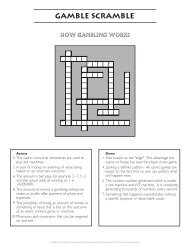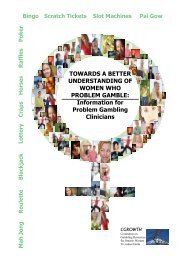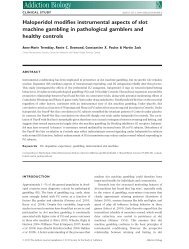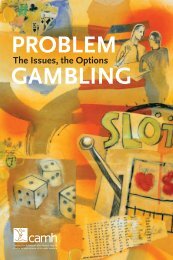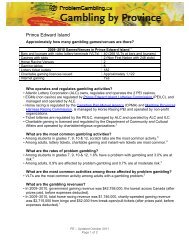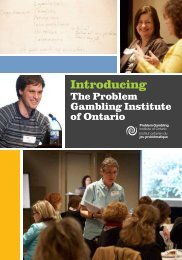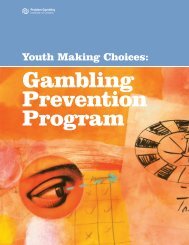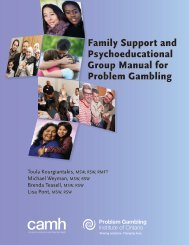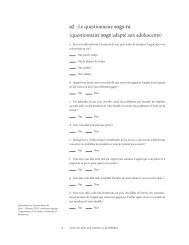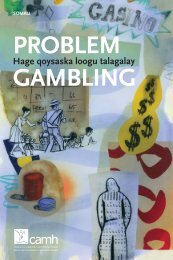Problem Gambling - A Guide for Families (PDF) - ProblemGambling.ca
Problem Gambling - A Guide for Families (PDF) - ProblemGambling.ca
Problem Gambling - A Guide for Families (PDF) - ProblemGambling.ca
Create successful ePaper yourself
Turn your PDF publications into a flip-book with our unique Google optimized e-Paper software.
Moving toward Change<br />
• consider couples or family counselling to improve communi<strong>ca</strong>tion<br />
and trust<br />
• keep dealing with money problems<br />
• keep focusing on your own needs and on getting family life<br />
back in balance (see page 33)<br />
• understand that a gambling slip may occur. Try to maintain a<br />
balanced approach to gambling slips.<br />
stage 5: maintenance: the person is<br />
maintaining control<br />
The person has stopped gambling <strong>for</strong> at least six months and<br />
is working to hold onto this success. Other problems may<br />
emerge as gambling is less of an issue. It’s important to work<br />
through these concerns to keep the risk of relapse down.<br />
Change ef<strong>for</strong>ts may move to new areas, such healing hurt<br />
relationships and restoring trust.<br />
A relapse <strong>ca</strong>n<br />
help a person<br />
understand his<br />
or her gambling<br />
problem better,<br />
and strengthen<br />
the person’s<br />
decision to<br />
change.<br />
As we said above, gambling slips may occur at any stage and<br />
are not uncommon when someone is trying to make a<br />
change. A slip or a relapse <strong>ca</strong>n feel devastating to both the<br />
person with gambling problem and family members. But a<br />
relapse <strong>ca</strong>n also help the person understand the problem better.<br />
In the end, it <strong>ca</strong>n strengthen his or her decision to change.<br />
You <strong>ca</strong>n:<br />
• keep supporting changes that bring more balance to family life<br />
• try to improve family communi<strong>ca</strong>tion<br />
• keep working to get the family’s money under control<br />
• arrange finances to limit losses in the <strong>ca</strong>se of a relapse<br />
• help the person identify and cope with gambling triggers<br />
• reward ef<strong>for</strong>ts at change in both your loved one and yourself<br />
• understand that the person may have relapses.<br />
dealing with relapses<br />
Remember, a gambling problem may get worse be<strong>for</strong>e it gets<br />
better. Some people with gambling problems find it very hard to<br />
get their gambling under control or stop. If the person has a big<br />
27





